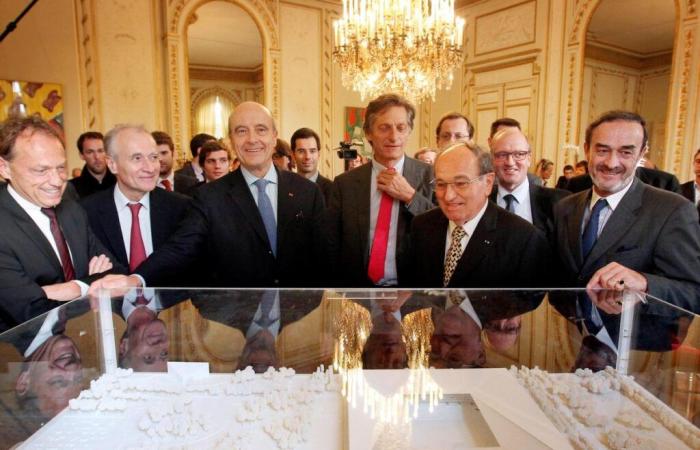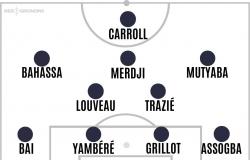
En November 2011, the contract for the construction and operation of the future “large stadium” was signed between the City of Bordeaux and the private company Stade Bordeaux Atlantique (SBA), a subsidiary of Vinci and Fayat. On the political scene, Homeric debates between the majority and the opposition take place within the Municipal Council. When we look back at the minutes of the sessions, we are struck to see that the worst-case scenario that seems to be emerging today – risk of liquidation of the Girondins, threat of SBA filing for bankruptcy – was already at the heart of the discussions . Four main players are fighting: mayor Alain Juppé and his sports assistant Arielle Piazza for the majority, socialist elected official Matthieu Rouveyre and ecologist Pierre Hurmic on the opposition side.
The statements that we transcribe below are taken from two municipal councils: that of May 2010, which voted to designate the Girondins as the stadium’s resident club, and that of October 2011 for the signing of the partnership contract with SBA, which engages the community until 2045.
“A public service mission”
May 2010, Arielle Piazza: “The more I advance on this issue, the more I am convinced that we need this large stadium. This project fits so closely with the development of our Girondins club, which has shown the extent to which it has national influence. It’s not [seulement] structuring equipment for 23 or 25 matches. We are working on the multifunctionality of this equipment as part of a public service mission. » What follows will show that, far from contributing to public service, the Matmut stadium is a purely commercial facility.
Same session, Matthieu Rouveyre points out the rent that the Girondins undertake to pay for thirty years: “If this sum can be absorbed during good seasons, it will represent an exorbitant cost in the event of poor sporting results. [Sur] a period of thirty years, these poor sporting results, even if we do not wish them, are to be imagined, it is not up to the community to pay in the event of the club’s failure. What matters to us today is to best protect the interests of the people of Bordeaux that you are involving in your pharaonic project. »
Pierre Hurmic: “Once the Euro 2016 competitions are over, communities will find themselves with oversized equipment which will prove extremely expensive to maintain. I am not convinced either, Mr. Mayor, that tomorrow football will have the place it has today. »
“I will not sign”
Alain Juppé retorts that all precautions are taken, including in the event of SBA failure: “We will not do [le stade] under any conditions, at any price. I will not commit the city of Bordeaux to financial commitments that would be unbearable for it. If there is not a system to ensure, in one way or another, that [SBA] will keep its commitments for the duration of the contract, I will naturally not sign this contract. »
“If the club is not able to commit to this period, it should not commit, but the City will not guarantee its rent” (Alain Juppé, in May 2010)
He then affirms that the community will not pay in place of the club either: “I hasten to say that I refused very clearly from the start that the City would give this type of guarantee. This was one of the sine qua non conditions that I set in the negotiation with the club. If the club is not able to commit to this period, it should not commit, but the City will not guarantee its rent. » In 2024, however, faced with the club’s difficulties, the Metropolis (which became the owner of the stadium in 2017) renounces demanding the planned rent. To help her, she did not activate the letter of intent required from M6, which became a letter of commitment signed by Gérard Lopez.
“The rent will be paid”
October 2011, one month before signing the contract with SBA, Alain Juppé: “During Euro 2016, the whole world will be able to appreciate the quality and modernity of our facilities. The functional and versatile venue offers quality and flexibility for the organization of large-scale events which will contribute to the cultural influence of Bordeaux, the metropolitan area and the region. »
-“Former budget minister, you know better than anyone that we are heading straight into the wall” (Mathieu Rouveyre, in October 2011)
He then specifies: “The Girondins club assumes the sporting risk. The rent will be independent of the level of competition in which the professional team plays. If unfortunately it were to downgrade, the commitment of the club’s shareholders remains valid, the rent will be paid. » A letter of intent guarantees this.
Matthieu Rouveyre retorts: “You know full well that the day the club will no longer be able to pay its rents, this letter of intent which perfectly bears its name will not allow the Girondins to face their responsibilities. You could have, you should have refused to commit until the shareholder presented a proper guarantee. You settled for a letter of intent. You have given up and exposed the community, and therefore the taxpayers. Contrary to what you say, the sporting risk is not borne by the club, but indeed by the Bordeaux taxpayer. Former budget minister, you know better than anyone that we are heading straight into the wall. » This famous letter of intent, today a letter of commitment, which the Metropolis keeps like a sword of Damocles if, one day, it is necessary to push Lopez towards the exit to clear the way for a buyer.
“The sporting risk is not borne by the club, but indeed by the Bordeaux taxpayer,” argued Matthieu Rouveyre in October 2011. Thirteen years later, the club is playing in National 2.
Thierry DAVID / SO
Rouveyre continues: “Over thirty years, this stadium will cost a minimum of 467 million euros. This is the addition of community and state subsidies, the club’s contribution and the rent over thirty years. Of these 467 million, which are therefore both investment and operation, all covered in bank charges, the club undertakes to pay 135 million. In other words, this stadium which will be mainly occupied by the Girondins, will only be financed by them up to 29%. Can you tell us, Mr. Mayor, if you financed the working tools of other Bordeaux companies up to 70%? »
Hurmic, Juppé and the “letter of intent”
During the municipal council in October 2011, the ecologist Pierre Hurmic – then an opponent – questioned the legal value of the letter of intent supposed to guarantee the payment of rent by the Girondins. “You have managed to obtain from the club’s shareholder what is called a letter of intent. Some people talk about an M6 guarantee. No, there is no guarantee from M6, there is a simple letter of commitment which, in my opinion, […] does not guarantee us the rent paid by the Girondins, the 3.8 million euros for thirty years. At some point, we may be exposed to the bankruptcy of the club. Case law and doctrine consider the letter of intent signed by M6 to often be a simple letter of comfort or appeasement and that the legal scope of these letters varies greatly. For some it is a moral obligation, while for others it can give rise to a real civil obligation to act. »
In response, Alain Juppé cites the civil code: “The letter of intent is the commitment to do or not to do, having as its object the support provided to a debtor in the execution of his obligation towards his creditor. “So, contrary to what Mr. Hurmic puts forward, such a letter is a legally valid and binding commitment for the person who issues it or for the person who replaces the person who originally issued it.” He did not foresee what happened: that the community gave up activating this letter.



